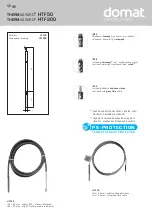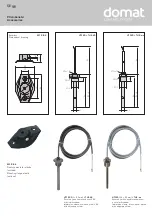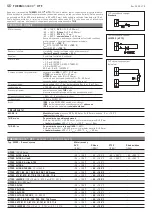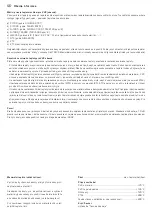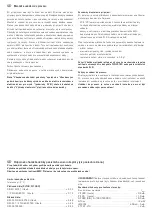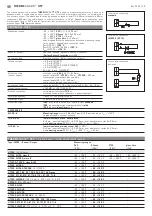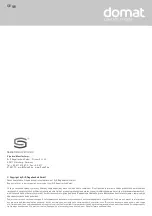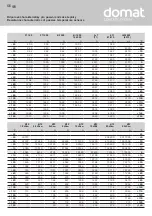
G
Installation and Commissioning
G
Resistance characteristics of passive temperature sensors (see last page)
In order to avoid damages ⁄ errors, preferably shielded cables are to be used.
Laying measuring cables parallel with current-carrying cables must in any case be avoided. EMC directives shall be observed!
These instruments must be installed by authorised specialists only!
ATTENTION, NOTE !
Testing current influences the thermometer‘s measuring accuracy
due to intrinsic heating and therefore, should never be greater than
as specified below:
Standard values for testing current:
Sensor current, maximum ................................................................. I
max.
Pt1000 (thin-layer) .................................................................... < 0,6 mA
Pt100 (thin-layer) .................................................................... < 1,0 mA
Ni1000 (DIN), Ni1000 TK5000 ............................................. < 0,3 mA
NTC xx ............................................................................................ < 2 mW
LM235Z ............................................................................. 400 µ A … 5 mA
KTY 81 - 210 .................................................................................... < 2 mA
Limiting deviation according to classes:
Tolerances at 0 °C:
Platinum sensors (Pt100, Pt1000):
DIN EN 60751, class B ................................................................± 0.3 K
1 ⁄ 3 DIN EN 60751, class A ........................................................± 0.1 K
Nickel sensors:
NI1000 DIN EN 43760, class B .................................................± 0.4 K
NI1000 1 ⁄ 2 DIN EN 43760, class B.........................................± 0.2 K
NI1000 TK5000 ...........................................................................± 0.4 K
Devices are to be connected under dead-voltage condition. Devices
must only be connected to safety extra-low voltage. Consequential
damages caused by a fault in this device are excluded from
warranty or liability. These devices must be installed and commissioned
by authorised specialists. The technical data and connecting conditions
shown on the device labels and in the mounting and operating instruc-
tions delivered together with the device are exclusively valid. Deviations
from the catalogue representation are not explicitly mentioned and are
possible in terms of technical progress and continuous improvement
of our pro ducts. In case of any modifications made by the user, all
warranty claims are forfeited. Operating this device close to other
devices that do not comply with EMC directives may influence functionality.
Thisdevice must not be used for monitoring applications, which serve the
purpose of protecting persons against hazards or injury, or as an
EMERGENCY STOP switch for systems or machinery, or for any other
similar safety-relevant purposes.
Dimensions of enclosures or enclosure accessories may show slight
tolerances on the specifications provided in these instructions.
Modifications of these records are not permitted.
In case of a complaint, only complete devices returned in original
packing will be accepted.
Our “General Terms and Conditions for Business“ together with the
“General Conditions for the Supply of Products and Services of the
Electrical and Electronics Industry“ (ZVEI conditions) including
supplementary clause “Extended Retention of Title“ apply as the
exclusive terms and conditions“.
Notes on installation:
Mounting shall take place while observing all relevant regulations and
standards applicable for the place of measurement (e.g. such as
welding instructions, etc.). Particularly the following shall be regarded:
– VDE ⁄ VDI directive technical temperature measurements,
measurement set - up for temperature measurements.
– The EMC directives must be adhered to.
– It is imperative to avoid parallel laying of current-carrying lines.
– We recommend to use shielded cables with
the shielding being attached at one side to the DDC ⁄ PLC.
Before mounting, make sure that the existing thermometer‘s technical
parameters comply with the actual conditions at the place of utilization,
in particular in respect of:
– Measuring range
– Permissible maximum pressure, flow velocity
– Installation length, tube dimensions
– Oscillations, vibrations, shocks are to be avoided (< 0.5 g)
Attention! In any case, please observe the mechanical and
thermal load limits of the protective tubes according to DIN
43763 or according to specific S+S standards!
Notes on commissioning:
This device was calibrated, adjusted and tested under standardised
conditions.
When operating under deviating conditions, we recommend performing
an initial manual adjustment on-site during commissioning and
subsequently at regular intervals.
Commissioning is mandatory and may only be performed by
qualified personnel!
Summary of Contents for THERMASGARD HTF 200
Page 7: ......


